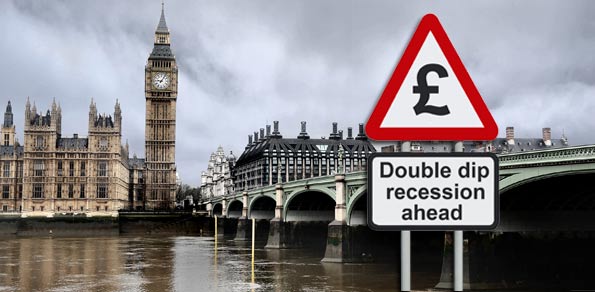The British economy shrank by 0.2% in the fourth quarter of 2011, according to official ONS figures, edging closer to a recession (defined in the UK and Europe as two or more consecutive quarters of contraction). This is worse than economists expected, having pencilled in a 0.1% contraction. In the third quarter of 2011, the economy had grown 0.6%.
The Office for National Statistics’ first estimate for the fourth quarter (-0.2%) showed the first contraction in a year. In 2011 as a whole, the economy grew by 0.9%, less than half the pace of 2010. The breakdown of the GDP numbers reveals that manufacturing acted as a big drag on the economy. Factory output fell by 0.9% between October and December, the biggest quarterly fall since the autumn of 2009. Overall industrial production, which also includes utilities and mining, was down 1.2%. Construction output fell by 0.5% while service industries recorded a flat performance.
Germany’s closely-watched Ifo business sentiment index has climbed for a third month to hit 108.3 in January, versus forecasts of 107.6. The index is based on a monthly survey of around 7,000 companies. This boosted the euro to a session high of $1.3052. Together with surveys showing manufacturing and service industries expanded more than economists forecast this month, suggests that Germany might have avoided contraction in the fourth quarter. The International Monetary Fund yesterday cut its prediction for German expansion in 2012 but it stated that the economy will weather a recession in the region and keep growing albeit less than originally forecast.
Bank of England governor Sir Mervyn King suggested more QE for the UK economy last night, suggesting that the path to economic recovery would be “arduous, long and uneven”. He warned that the huge debt burden run up by households, banks and the government would weigh on the UK economy for many years to come. The comments came after official figures yesterday showed the UK’s national debt had finally surged past £1tn for the first time despite the deficit, in monetary terms, being reduced.
Market Overview
European stocks dropped for a second day amidst a report showing that the U.K. economy contracted more than forecast. Nasdaq-100 Index futures rose after Apple Inc.’s profit more than doubled, the yen continued to weaken after announcing the first dropping to one-month lows versus the dollar and the euro, after Japan reported its first annual trade deficit since 1980. The pound stayed lower against the dollar after the report and was trading at $1.5552 as of 9:32 a.m. in London, down 0.5 percent on the day. The yield on the 10-year U.K. government bond fell 2 basis points to 2.16 percent.
The Stoxx Europe 600 Index had slipped by 0.6 percent at 9:50 a.m. in London. Nasdaq-100 futures jumped 0.5 percent after Apple shares jumped 7 percent in German bourses. The yen weakened versus all 16 major peers, falling 0.5 percent versus the dollar. The German 30-year bond yield dropped two basis points before an auction of the debt. Standard & Poor’s 500 Index futures expiring in March fell 0.2 percent.
Market snapshot as of 10:30 am GMT (UK time)
The Nikkei index closed up 1.12%, the ASX 200 closed up 1.11%. European bourse indices are mainly in negative territory due to the lingering doubts over Greece defaulting the possible contagion and the negative GDP figures from the UK. The STOXX 50 is down 0.59%, the FTSE is down 0.4%, the CAC is down 0.39%, the DAX is down 0.14% and the MIB is down 0.45%. the SPX equity index future is currently down 0.21%. Brent crude is down $0.10 per barrel Comex gold is down $3.80 an ounce.
The yen fell by 0.4 percent to 77.96 per dollar at 8:50 a.m. London time after reaching 78.01, the weakest level since Dec. 28. The euro climbed as high as 101.65 yen, the strongest since Dec. 28, before trading at 101.63. The 17-nation currency was little changed at $1.3035. It reached $1.3063 yesterday, the highest level since Jan. 4.
The yen has fallen 2.4 percent in the past week versus nine developed-nation counterparts, according to the Bloomberg Correlation-Weighted Currency Index. The dollar has depreciated 0.8 percent while the euro has gained 0.6 percent.





